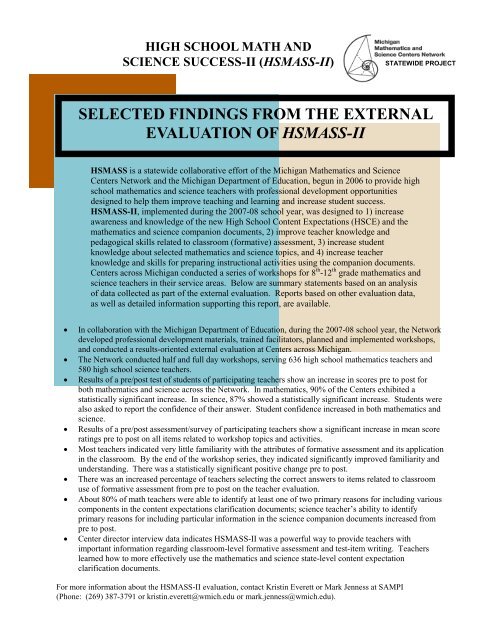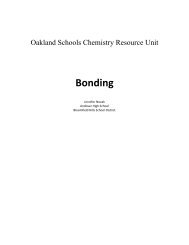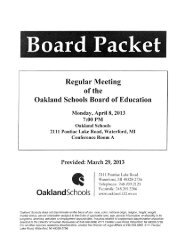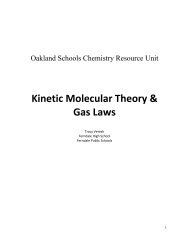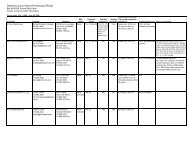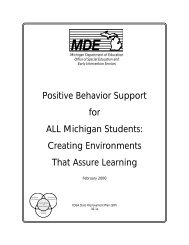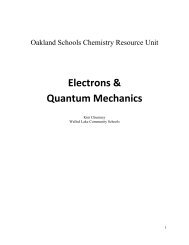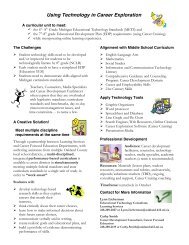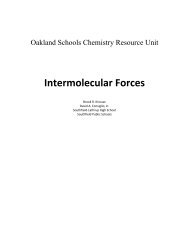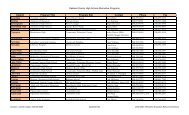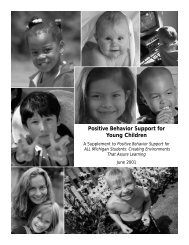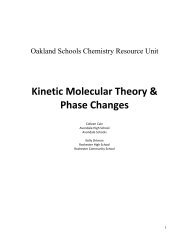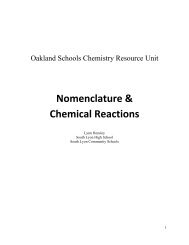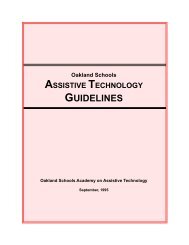Michigan Mathematics and Science Center ... - Oakland Schools
Michigan Mathematics and Science Center ... - Oakland Schools
Michigan Mathematics and Science Center ... - Oakland Schools
You also want an ePaper? Increase the reach of your titles
YUMPU automatically turns print PDFs into web optimized ePapers that Google loves.
HIGH SCHOOL MATH AND<br />
SCIENCE SUCCESS-II (HSMASS-II)<br />
STATEWIDE PROJECT<br />
SELECTED FINDINGS FROM THE EXTERNAL<br />
EVALUATION OF HSMASS-II<br />
HSMASS is a statewide collaborative effort of the <strong>Michigan</strong> <strong>Mathematics</strong> <strong>and</strong> <strong>Science</strong><br />
<strong>Center</strong>s Network <strong>and</strong> the <strong>Michigan</strong> Department of Education, begun in 2006 to provide high<br />
school mathematics <strong>and</strong> science teachers with professional development opportunities<br />
designed to help them improve teaching <strong>and</strong> learning <strong>and</strong> increase student success.<br />
HSMASS-II, implemented during the 2007-08 school year, was designed to 1) increase<br />
awareness <strong>and</strong> knowledge of the new High School Content Expectations (HSCE) <strong>and</strong> the<br />
mathematics <strong>and</strong> science companion documents, 2) improve teacher knowledge <strong>and</strong><br />
pedagogical skills related to classroom (formative) assessment, 3) increase student<br />
knowledge about selected mathematics <strong>and</strong> science topics, <strong>and</strong> 4) increase teacher<br />
knowledge <strong>and</strong> skills for preparing instructional activities using the companion documents.<br />
<strong>Center</strong>s across <strong>Michigan</strong> conducted a series of workshops for 8 th -12 th grade mathematics <strong>and</strong><br />
science teachers in their service areas. Below are summary statements based on an analysis<br />
of data collected as part of the external evaluation. Reports based on other evaluation data,<br />
as well as detailed information supporting this report, are available.<br />
• In collaboration with the <strong>Michigan</strong> Department of Education, during the 2007-08 school year, the Network<br />
developed professional development materials, trained facilitators, planned <strong>and</strong> implemented workshops,<br />
<strong>and</strong> conducted a results-oriented external evaluation at <strong>Center</strong>s across <strong>Michigan</strong>.<br />
• The Network conducted half <strong>and</strong> full day workshops, serving 636 high school mathematics teachers <strong>and</strong><br />
580 high school science teachers.<br />
• Results of a pre/post test of students of participating teachers show an increase in scores pre to post for<br />
both mathematics <strong>and</strong> science across the Network. In mathematics, 90% of the <strong>Center</strong>s exhibited a<br />
statistically significant increase. In science, 87% showed a statistically significant increase. Students were<br />
also asked to report the confidence of their answer. Student confidence increased in both mathematics <strong>and</strong><br />
science.<br />
• Results of a pre/post assessment/survey of participating teachers show a significant increase in mean score<br />
ratings pre to post on all items related to workshop topics <strong>and</strong> activities.<br />
• Most teachers indicated very little familiarity with the attributes of formative assessment <strong>and</strong> its application<br />
in the classroom. By the end of the workshop series, they indicated significantly improved familiarity <strong>and</strong><br />
underst<strong>and</strong>ing. There was a statistically significant positive change pre to post.<br />
• There was an increased percentage of teachers selecting the correct answers to items related to classroom<br />
use of formative assessment from pre to post on the teacher evaluation.<br />
• About 80% of math teachers were able to identify at least one of two primary reasons for including various<br />
components in the content expectations clarification documents; science teacher’s ability to identify<br />
primary reasons for including particular information in the science companion documents increased from<br />
pre to post.<br />
• <strong>Center</strong> director interview data indicates HSMASS-II was a powerful way to provide teachers with<br />
important information regarding classroom-level formative assessment <strong>and</strong> test-item writing. Teachers<br />
learned how to more effectively use the mathematics <strong>and</strong> science state-level content expectation<br />
clarification documents.<br />
For more information about the HSMASS-II evaluation, contact Kristin Everett or Mark Jenness at SAMPI<br />
(Phone: (269) 387-3791 or kristin.everett@wmich.edu or mark.jenness@wmich.edu).


